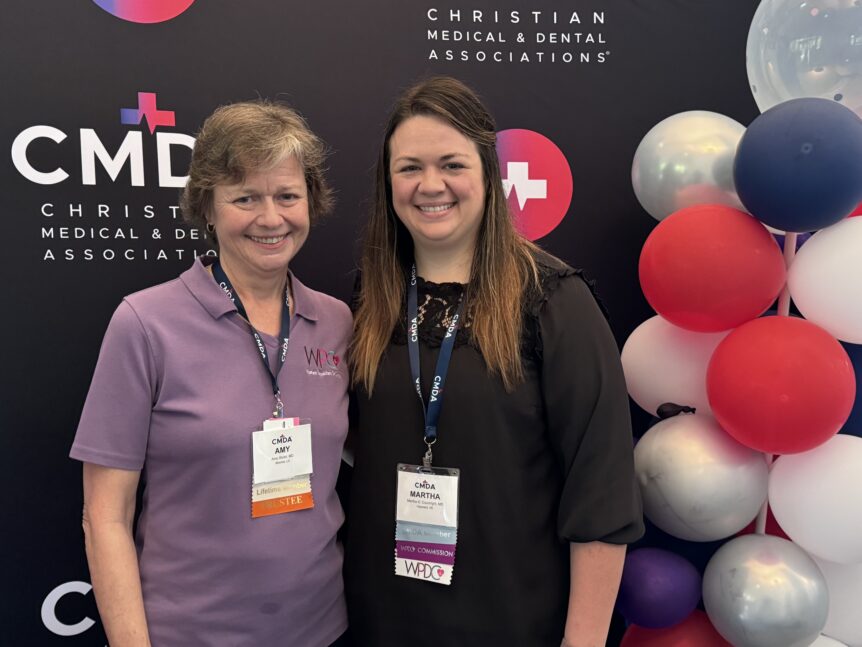by Amy Givler, MD; and Martha Grace Courtright, MD
This article first appeared in Christian Medical and Dental Associations‘ magazine, CMDA Today, Spring 2025 edition.
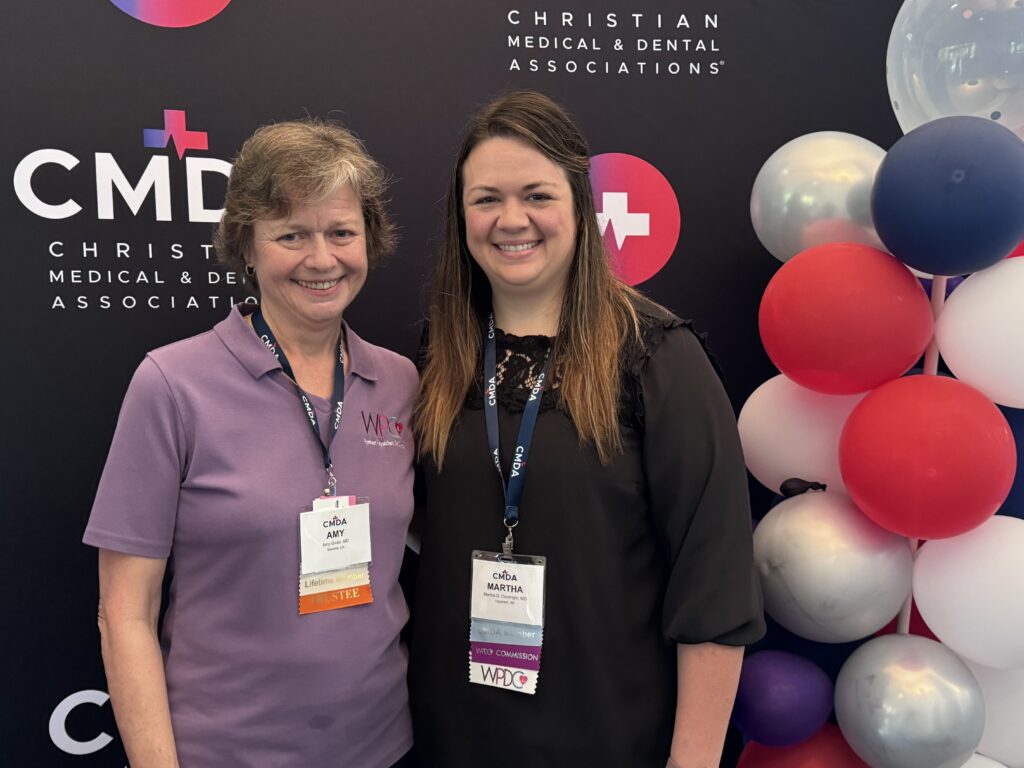
Amy
Dear Martha Grace,
You ask how I came to choose medicine. I guess I’d have to say it chose me. That is, I was 12 years old when I first heard and responded to the good news of salvation through Jesus, and simultaneously, in some mysterious way, I knew I was supposed to be a doctor. I had never considered medicine before I became a Christian, and afterward I never considered anything else.
Mom had trained as a nurse, though she stopped working as soon as your Aunt Franny was born. You know how proud she was to be a nurse, and I think she was a bit sad I didn’t go into nursing. My laser focus was on becoming a physician.
Growing up, I didn’t know many professional women, at least those who were married. That was even more true of our friends at church. Few there worked outside the home. Jesus had captured my heart, and so I only wanted to marry a Christian. But what Christian man would want to marry a physician? So I assumed God wanted me to be an unmarried missionary overseas. Plenty of heroic women, generally single, had blazed that path, and I admired them. Could God use me there also?
Then your dad came along — a medical student who loved Jesus and wasn’t fazed by the thought of a professional wife. It was CMDA that brought us together, since we were both attending the meetings and social events it sponsored.
We married during medical school, and for years we barely had time to nurture our relationship. The thought of bringing a baby into the mix would have taxed our already depleted resources. I know there are women who have babies during medical training, but their stamina surpasses mine.
Still, we hoped to have children one day. In fact, even before marriage I’d bought the cutest little infant-sized set of scrubs, complete with a caduceus and “MD” on its top. It wasn’t that I wanted my (potential) kids to become doctors — I wasn’t thinking that far ahead — but I loved medicine and hospitals and taking care of patients. I was (and am) immersed in that world.
So, imagine my joy when — 16 months after finishing residency — you were born, and I was able to put that little set of scrubs on you. One of my all-time favorite photos is the one of Mom and you, with you wearing those scrubs and clutching my stethoscope.
Wearing scrubs suited you well, even then.
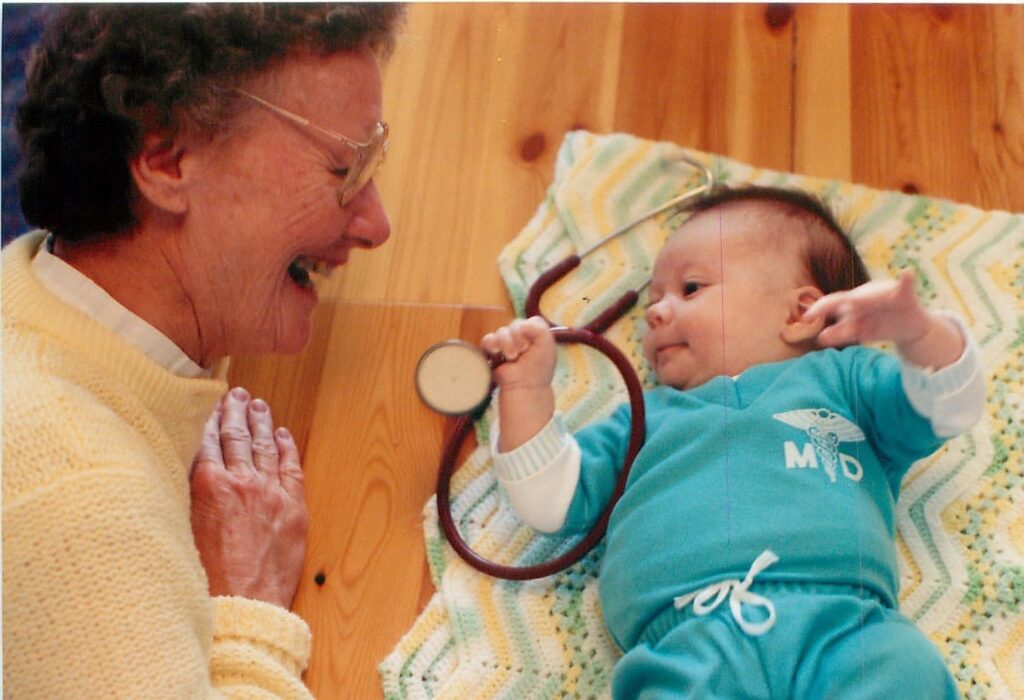
With much love,
Mom
Martha Grace
Dear Mom,
Growing up, it was easy to see why you and Dad love what you do. You love your patients, and your patients love you. I remember that if I ever came to visit one of you at work and I let it slip I was your daughter, a patient would inevitably grab me and tell me how grateful they were for you and your care for them. It didn’t really bother me if Dad had to get called in to the hospital or if you had to answer a patient call at home. I knew you were helping people, and I knew you saw it as a vocation, not just a job.
It felt pretty normal for me to have a working mom. You have said it was much less common in the years you were growing up, especially in the Christian community. I suppose, in retrospect, it wasn’t as common even when I was growing up as it is now. I don’t remember you ever disparaging mothers who stayed home, in fact you chose to work only part-time so you could be more present during our childhoods. Even that took some coordinating—school pickup and drop off, household tasks, being present for the performances and games. I am grateful to have had that example since I am now the working parent, and let me just say this: It is not easy!
I do think my desire to be a physician started pretty early, though not quite as early as when I was wearing that infant-sized set of scrubs! You probably remember my teenage years when I considered a couple of different careers, but nothing else really intrigued me like medicine.
Did you and Dad push me into medicine? No; in fact, you might have been slightly discouraging in the beginning just to make sure I knew what I was getting myself into. Once I made up my mind, you were nothing but supportive. I was so grateful to have your insights and direction as I embarked on that journey. When I didn’t get into medical school the first time I applied, I remember several conversations on the next steps to take. How I valued your advice and perspective!
Much love,
Martha Grace
Amy
Dear Martha Grace,
I’m happy you didn’t feel “pushed” into medicine, but even happier you didn’t begrudge our commitment to it, despite the obligations of parenthood, which we took seriously.
The early years of parenthood were crazy busy. Having three kids so close together was strategic in several ways. That is, we were going through only one “phase” of parenting at a time. When you were toddlers, you were all toddlers. When you were school-aged, you were all school-aged. This worked well for my brain, as I could focus on a single developmental stage. However, it also meant life was often chaotic.
I was tired. Deeply. And chronically. Don and I loved being your parents, but we were also working at the hospital — me part-time seeing outpatients, him full-time as residency director. Our friends were mostly fellow parents or folks from church. I longed to have women friends who understood the world of medicine. That is why — the first I heard of it — I jumped at the chance to attend a conference of Christian women physicians. It seemed too good to be true — fellow women, fellow physicians, but most importantly fellow followers of Christ.
I didn’t actually meet anyone at that first conference, ironically, because I was so emotional at being in the same space with Christian professional women that I pretty much just sat in the back row weeping. It’s hard to meet people when you’re weeping. And I do not, as you know, weep often. I have not missed a Women Physicians & Dentists in Christ (WPDC) annual conference since then. And, without further weeping, I have made cherished friends. So many women in this photo are among my favorite people, and I know if I could just hang out with the ones I don’t know, we’d have much in common and we’d become friends.
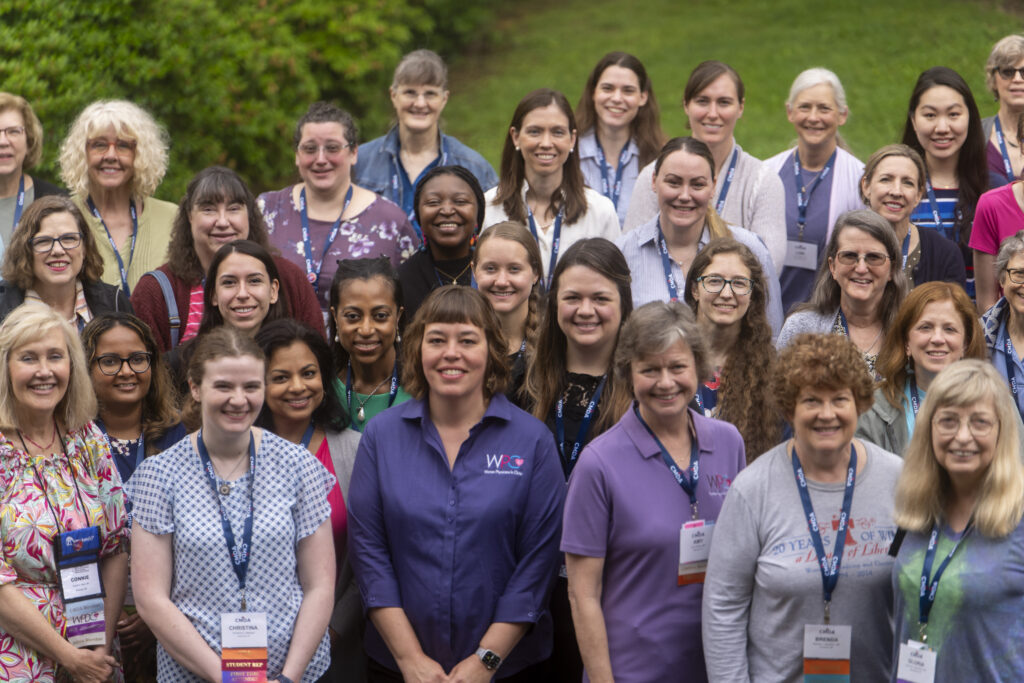
I love seeing you in this photo. Little did I know when I first became involved with WPDC that it would one day also be important to you. First, of course, you needed to choose medicine as a profession, and I am so glad you did. I remember when you were applying to medical school and an interviewer asked what your father and I, both doctors, thought of your following suit. You said we were happy about it, which was and is true, but he was astonished. Most medical parents, apparently, actively discourage their children from medical careers. That makes me so, so sad. Caring for my patients all these years has been such a privilege, and it’s been so full of joyful moments.
I know I thanked you at the time, but I want to thank you again for asking Don and me to hood you at your medical school graduation ceremony. I treasure the memory.
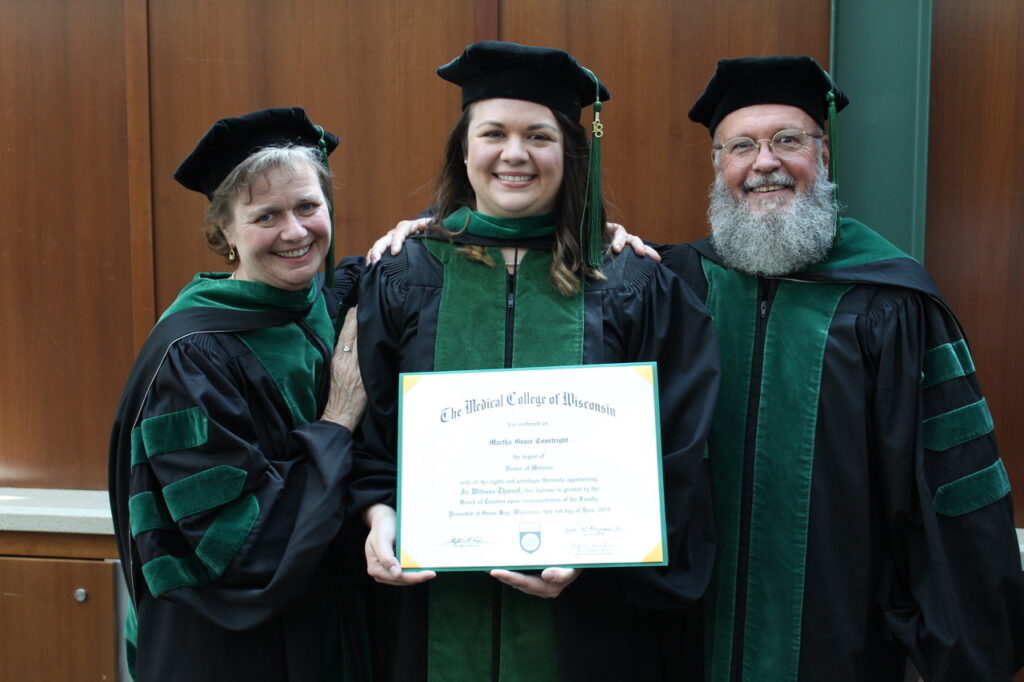
I know how much CMDA meant to me as a medical student, and I was glad you also had an active student chapter. I loved watching you move through medical training, especially when we could start discussing cases, trying to tease out a difficult diagnosis or figure out the best treatment for a particular illness.
Early on, I was the expert, or at least the one more in touch with “the real world” — that is, how medicine is realistically practiced today. Over the years, though, especially after you finished family medicine residency and started working, that balance tipped. I’m now much more likely to be asking you about current treatments, especially regarding obstetrics and gynecology. Your knowledge base is far superior to mine. I’m still your mother, but my position has shifted from being leader/director to being mentor/peer.
I value you as a colleague.
With much love,
Mom
Martha Grace
Dear Mom,
It has been a unique experience making the transition from the mother-child relationship to more of a peer relationship. However, I can certainly say I have appreciated your insights over the years, especially when it comes to what it takes to make a medical marriage work.
You and Dad don’t have a perfect marriage (who does?), but I always saw you supporting each other. Still, I never really planned to get married before medical school. Marriage is hard and medical school is hard, so trying to do them both at the same time didn’t seem to make sense. I felt a bit like you did before you met Dad; that is, it didn’t seem like most men would want a medical wife, especially not one who is about to go through several years of training. Then, as you put it, “along came Kyle.”
I am so grateful to have Kyle in my life. It’s hard to envision what it would have looked like to go through training without him, but what I can envision seems so much harder and lonelier than it was.
Before we got married, I remember you trying to prepare us. You and Dad sat us down to talk about what a marriage going through medical training might look like. I think you had seen so many couples struggle in their medical marriages over the years that you wanted to do what you could to set us up for success.
You told Kyle he would likely go long stretches with barely seeing me, and this was not by my choice. You told me you thought Kyle had the personality, especially the flexibility, to be able to handle it. I think the word you have used to describe him is “unflappable.” Your advice to us was twofold: One, have realistic expectations of each other, and two, invest in a local church community. We are both incredibly grateful for that advice. While I wouldn’t say medical school and residency were easy on our marriage, I do feel those early conversations set us up for success.
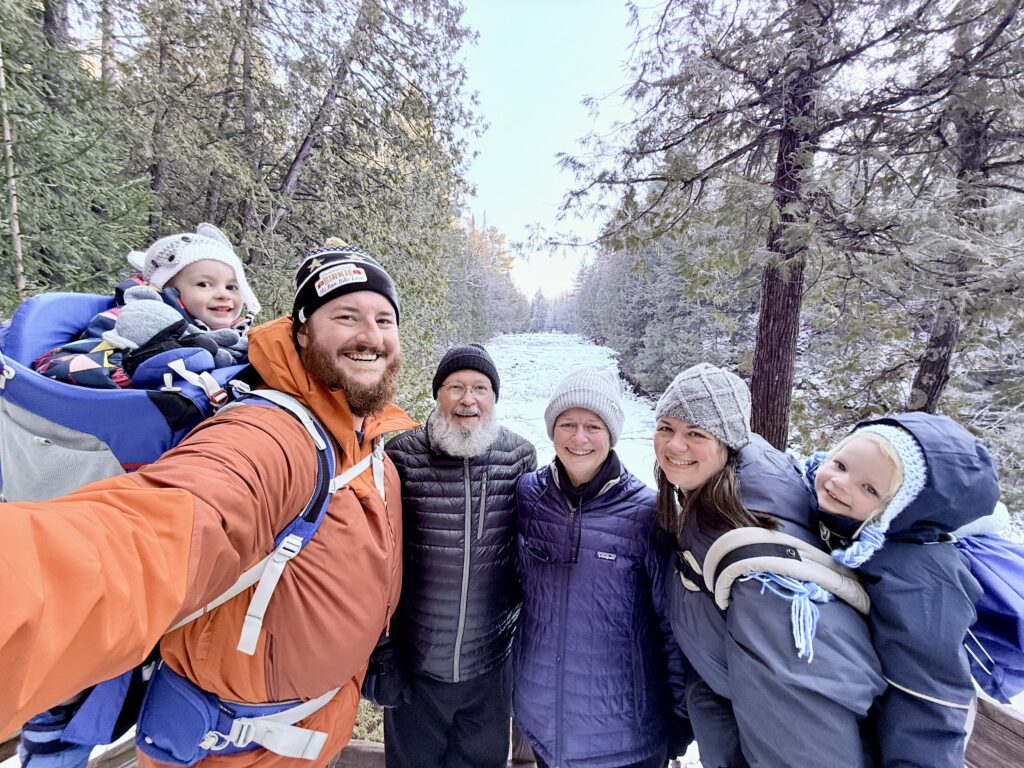
As a college student, I remember helping you with the WPDC conference you were organizing. I met several of the women at that conference who I am now working with on the WPDC Commission. You talked about how revolutionary that community was for you, to have a cadre of women who really “got” you. I do have people in my life I can talk to about motherhood and a shared career. However, if I didn’t have WPDC, I would have few people in my life who could understand the challenges of being a mother, working as a physician and being a believer in Christ. Having a sisterhood I can share the trials and joys of all these facets of life is really remarkable, and it is so appreciated.
My first CMDA National Convention was in medical school, when a group of us students road-tripped through the night from Wisconsin to North Carolina to get to it. I think that was the first conference we attended together. I remember how special it felt to be able to discuss the speakers and presentations, be introduced to your friends and share that experience together. I may have lost count, but I think we are now at seven CMDA/WPDC conferences attended together!
Much love,
Martha Grace
Amy
Dear Martha Grace,
Looking back at your childhood, I find myself second-guessing a number of my choices. Raising children is so full of unknowns. Who is this little person God entrusted me with? What is her personality, and how should I adjust my mothering to account for that? How can I prepare him for the challenges he and his entire generation will face?
Starting out, none of us parents know the answers to those questions. I am cheering you on as you embark on your own parenting journey. What will life be like for Izzy and Liam in 20 or 30 years?
I am a Boomer who raised Millennials, and you are a Millennial who is raising Gen Alphas. Of course, every human is unique, but generations do tend to have their own distinctives. My generation tends to persevere in jobs even if they’re not fulfilling, and in our parenting, we tended to hover. Your generation is less willing to have work define you, and life outside of work is prioritized. What will be the defining characteristics of Gen Alphas? How can you and Kyle parent them now for their future needs then?
Of course, you don’t know. I don’t know. Nobody knows. We can only lean on Jesus every day for wisdom on how to “Direct your children onto the right path” (Proverbs 22:6a, NLT). That certainly means pointing them to Christ as the source of all goodness. Know that I pray for you and for them every day.
With much love,
Mom
Get Involved
Women Physicians & Dentists in Christ (WPDC) is an outreach ministry of CMDA to provide resources for Christian women physicians and dentists to integrate their personal, professional and spiritual lives. We encourage and support Christian women and physicians as we share the unique challenges of our multiple roles. To learn more and get involved, visit cmda.org/wpdc.
About the Authors
Amy Givler, MD, is a family physician in Monroe, Louisiana, caring for outpatients in the same indigent-care hospital she trained in 40 years ago. She and Don, her fellow-physician husband, raised three children and are now enjoying grandparenthood. She serves on the CMDA Board of Trustees and has had leadership roles in the Women Physician & Dentists in Christ (WPDC) Commission. Together, Don and Amy are active in their church, help lead Marriage Enrichment Weekends for CMDA and have led and participated in many global health trips over the years. Amy is a writer for CMDA’s The Point blog, and she is the author of Hope in the Face of Cancer: A Survival Guide for the Journey You Did Not Choose.
Martha Grace Courtright, MD, is a family medicine physician practicing full-scope medicine in Hayward, Wisconsin. She has been a member of CMDA since medical school and is also a member of the American Academy of Family Physicians. She has served on the Women Physicians & Dentists in Christ (WPDC) Commission since 2020. She received her undergraduate degree in theology at Wheaton College and her medical degree from Medical College of Wisconsin. She has been married to Kyle for 11 years and has two children, Isabelle (4) and Liam (3).
